Menopause Hair Care: What Works Best for Women Over 50, According to Hair Pros
If it feels like just yesterday that you had luscious locks with tons of body and shine — and now, your hair is dull, dry and potentially thinner — it might not be your imagination. At least, that could be the case if you’re at the age of perimenopause or menopause. All of the changes your body is going through during this stage of life can affect more than just your cycle. You may have hot flashes or experience sudden mood swings. Physically, you might notice a change in your skin and your hair and scalp may start to have potential issues, too. Problem is every woman experiences this transition a little bit differently, so it’s difficult to say what will or won’t happen to your mane, among other things.
“When a woman is undergoing hormonal changes from perimenopause and menopause, the severity of the changes to hair can vary greatly from one person to another,” says trichologist Sara Hallajian, who works with AAVRANI. “Typically, we would see an increase in shedding, a widening of the part, smaller and shorter hairs, and likely texture changes, like frizzier or less shiny hair.” Sometimes the best defense against the unknown is preparing for what could happen, and that’s where menopause hair care comes in. You don’t have to change every product you’re using or invest in super pricey solutions. But it is a good idea to take stock of your hair’s health and make a few tweaks to counteract any unwanted changes in how it looks or feels. Ready to shore up your scalp to support hair growth, volume and brilliance? Here’s everything you need to know about menopause hair care.
What hair issues arise when going through menopause?
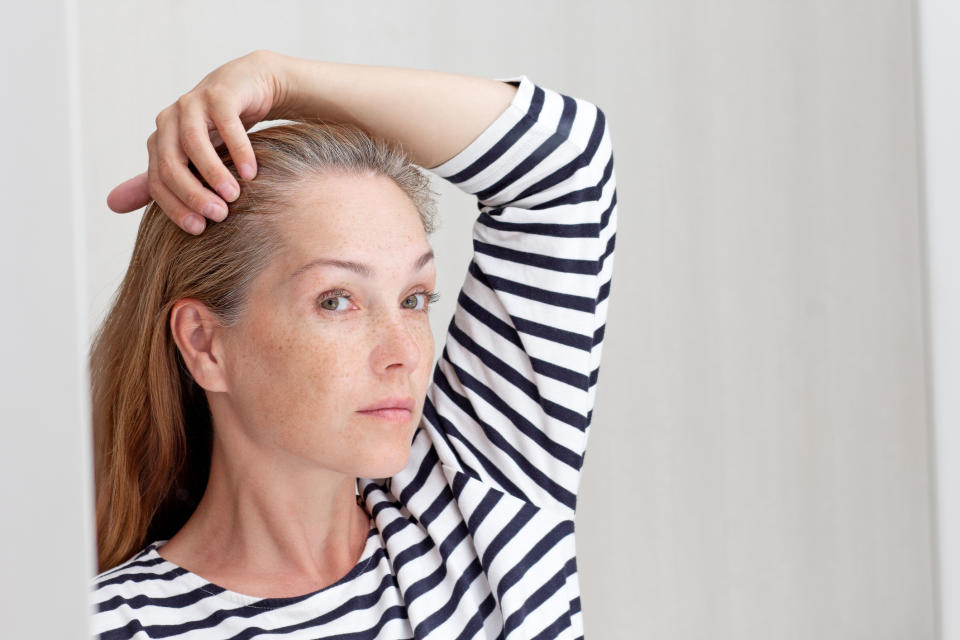
1. Dryness or sensitivity along the scalp
As you enter perimenopause and menopause, your hair and scalp could be in for quite the wild ride. That’s thanks to hormonal fluctuations. “We often see lowered estrogen levels when entering perimenopause and menopause, which can lead to scalp dryness, sensitivity, irritation, and hair thinning,” says Dendy Engelman, MD, FAAD, a board-certified dermatologist at Shafer Clinic. “This is often because the scalp becomes increasingly sensitive to male hormones, known as androgens, resulting in hair thinning or hair loss. The oil production in the scalp can also decrease as estrogen levels fall.”
2. Thinning, shedding and/or stalled growth
Trichologist Shab Caspara, who works with the Biotera brand, agrees the scalp is where you’ll likely notice a difference first when going through the change. Your scalp may feel “tight” and “dry,” she says, and the “higher ratio of testosterone to female hormones” can lead to hair shedding and weaker, finer strands. “Reproductive hormones, such as estrogen, progesterone, and prolactin, directly affect the duration of the growth phase of the hair cycle,” says Caspara. “When these drop, not only does the growth phase of hair shorten and more hairs get pushed towards shedding, but the thickness of hair strands and quality of hair also get affected.”
3. Changes to hair's luminosity and texture
Beyond your scalp being out of sorts, leading to your hair potentially being shorter, weaker, and thinner than before, you may also experience dryness, dullness, and texture changes. “Estrogen can also improve hair quality by affecting the follicle cell activity, resulting in healthier hair shafts that are prone to less breakage,” says Hallajian. The inverse is also true; when estrogen dips, then, breakage and frizzing can be more likely to occur.
For more on how menopause affects hair, watch the below YouTube video from Heather Hirsch, MD a board-certified internist who specializes in perimenopause and menopause.
Related: How to Fix a Receding Hairline: The TikTok Tricks That Actually Work for Women Over 50
What is menopause hair care?
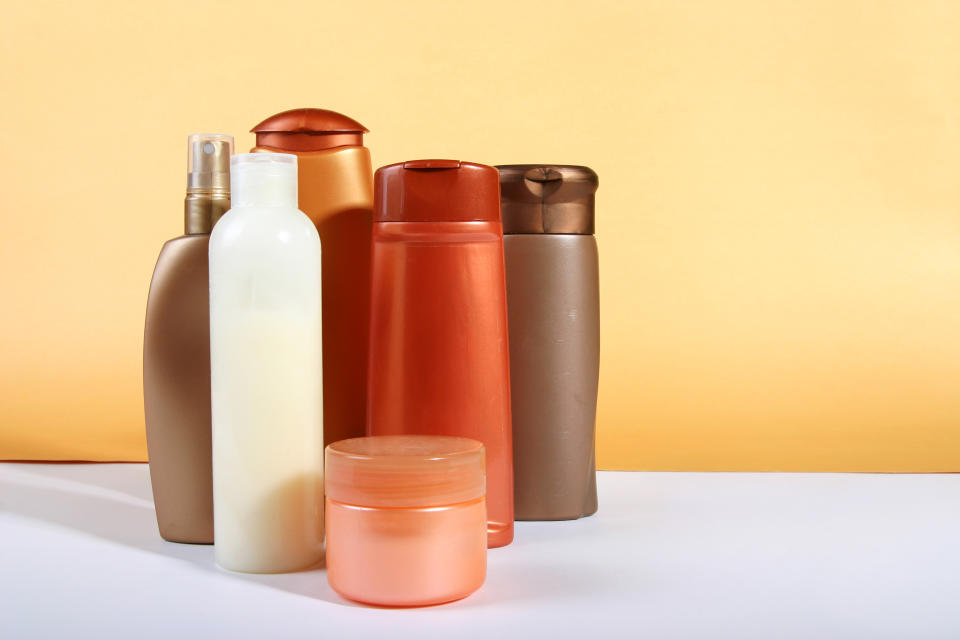
If you’re looking for a magic bullet menopause hair care product — or a line that will solve all your hair concerns during the change — well, that doesn’t exactly exist. But that doesn’t mean there aren’t products geared toward the issues your mane might encounter during the transition.
In fact, now’s the perfect time to reconsider your hair care regimen and consider incorporating products that might serve your scalp and strands more effectively than what you’re used to. “I would definitely review the products you're using and evaluate whether or not they are suitable for your scalp’s current and potential changes,” says Dr. Engelman. “For instance, rather than using an aggressive cleanser or a potent product that targets color correction, opt for a shampoo and conditioner that focuses on hair growth, sensitivity, and dryness.”
Though individual hair care routines may still run the gamut at this time, in general, the best products for perimenopause or menopause will gently moisturize and nourish versus aggressively strip or irritate. You might search for something volumizing, too. “To offset loss of volume, I recommend using volumizing shampoos and conditioners containing proteins that will bind to the hair cuticle to protect it from damage and give volume to the hair,” says Felipe Jimenez, PhD, chief science officer of NULASTIN, a beauty brand based upon elastin replenishment.
Related: 11 Best Hair Growth Products for Women Over 50 to Treat Thinning, According to Hair Loss Experts
The benefits of using menopause hair care
When you’re using mild, nourishing products working to counteract scalp dryness as well as hair loss, thinning, and dullness, you might be able to lessen the impact your hormones are having on the health of your scalp and hair. The right menopause hair care products will shore up and strengthen your strands and add body and volume back, if you’re lacking it.
What are the best ingredients in menopause hair care?
“Ingredients that help to repair the hair cuticle, like protein, and moisturize it, like vitamin E, ceramides and shea butter, are going to be your best bets,” says Jimenez. Dr. Engelman agrees and adds a few other hydrating ingredients to that list. “Hyaluronic acid is a gentle yet effective ingredient that attracts and retains water to help maintain that needed moisture,” says Dr. Engelman. She also likes argan oil for its antioxidant-rich properties, which you can look for in a conditioner for extra softness. “Green tea extract is another antioxidant-rich ingredient that promotes scalp health and may support hair growth,” says Dr. Engelman.
In general, Dr. Engelman suggests looking for products with ingredients compositionally-similar to the oils your scalp might not be producing as effectively during this phase of life. “Jojoba oil mimics the natural oils produced by the scalp that can be lost during perimenopause and menopause,” says Dr. Engelman. She adds that coconut oil “can soothe [a] sensitive scalp and replenish moisture.”
Finally, you can’t go wrong with a protein-packed formula to give your hair’s mid-shafts to ends a little love. “Hydrolyzed keratin supports the hair shaft to improve elasticity and strengthen hair structure,” says Dr. Engelman. Plus, proteins will also help with volume.
To see one woman's experience with hair loss and the menopause hair care that worked for her, watch the below video from @MrsMelissaM on YouTube.
Related: At-Home Keratin Treatment Gets You Silky, Shiny Hair for $100s Less Than at the Salon
The best menopause hair care products
When you’re in perimenopause and menopause, what you cleanse and condition with —a s well as what you choose to treat your scalp and strands with — matters. Though exact concerns may differ from woman to woman, these pro picks address some of the most common menopause hair issues.
Best menopause hair care product for heat styling
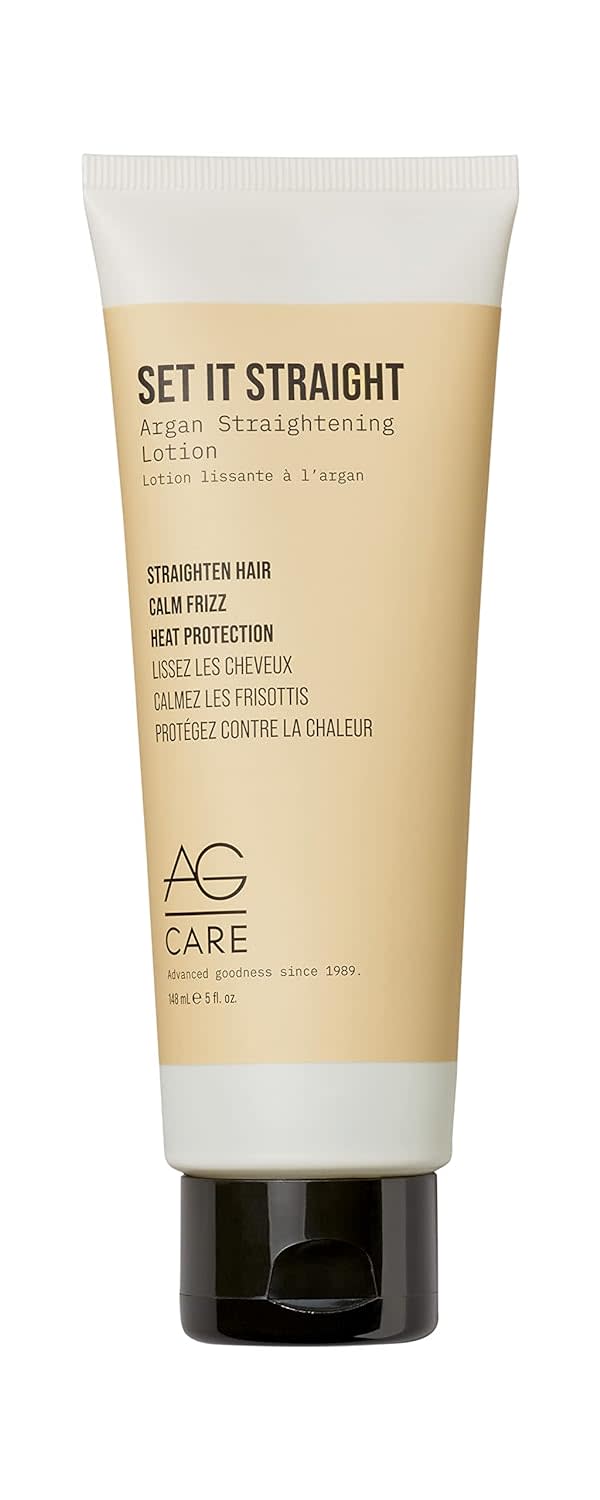
AG Care Set It Straight Argan Straightening Lotion
Dr. Omer Ibrahim, MD, FAAD a board-certified dermatologist at Chicago Cosmetic Surgery and Dermatology who specializes in hair loss and cosmetic dermatology, likes this styling aid when using hot tools on mature hair. “This product contains argan oil that gently defrizzes and detangles hair without leaving residue that can exacerbate oily or dandruff-prone scalps."
Best menopause hair care treatments
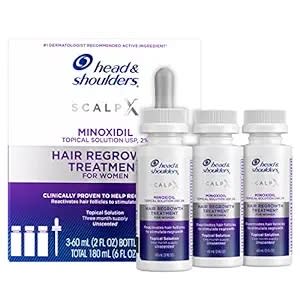
Head and Shoulders Scalp X Womens Minoxidil Treatment
“Head and Shoulders Scalp X Womens Minoxidil Treatment is a great drugstore option designed specifically for thinning hair,” says Dr. Engelman. “This Minoxidil treatment is clinically proven to stimulate hair follicles and regrowth.” You should see less shedding with consistent use and some potential regrowth with this product, too.
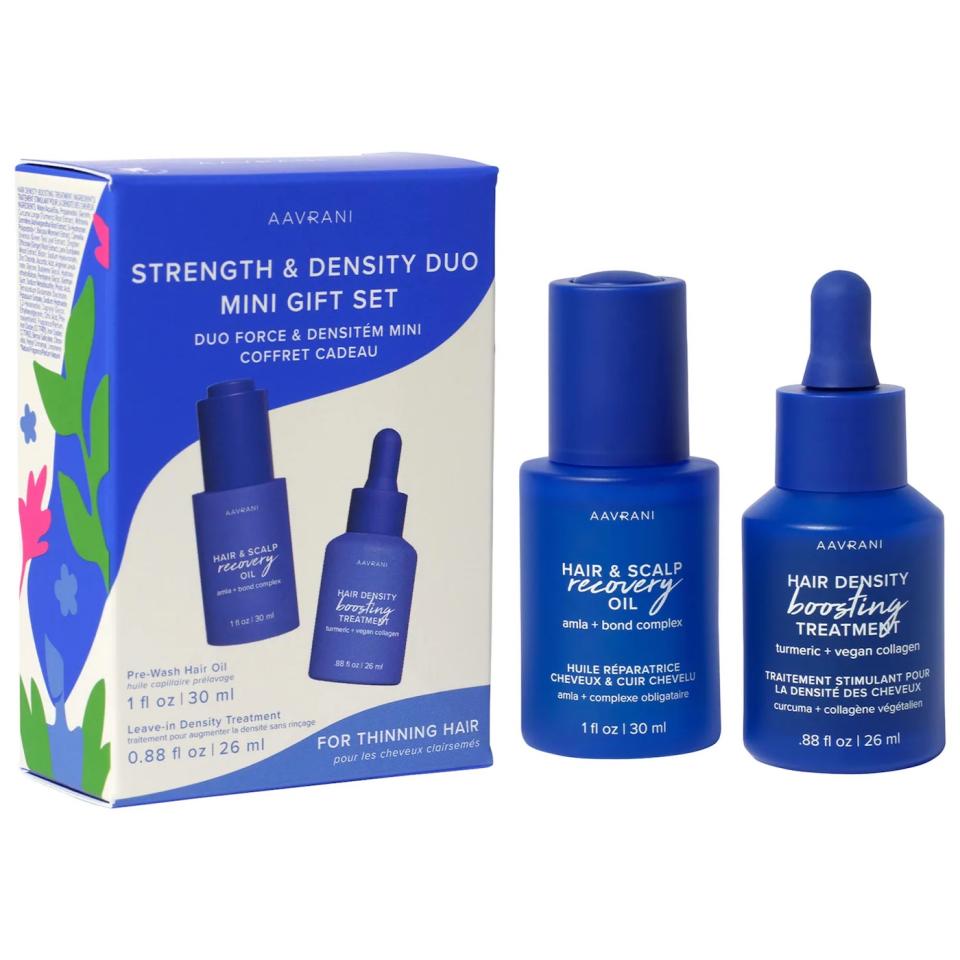
AAVRANI Mini Density Boosting Treatment and Recovery Oil Set
If you want a more intensive plan of attack for thinning, AAVRANI’s 28-day treatment pairs a growth serum with an oil to shore up your hair from the roots to the ends. “[It] keeps the scalp healthy and improves density and reduces shedding,” says Hallajian.
Best menopause hair care scalp oil
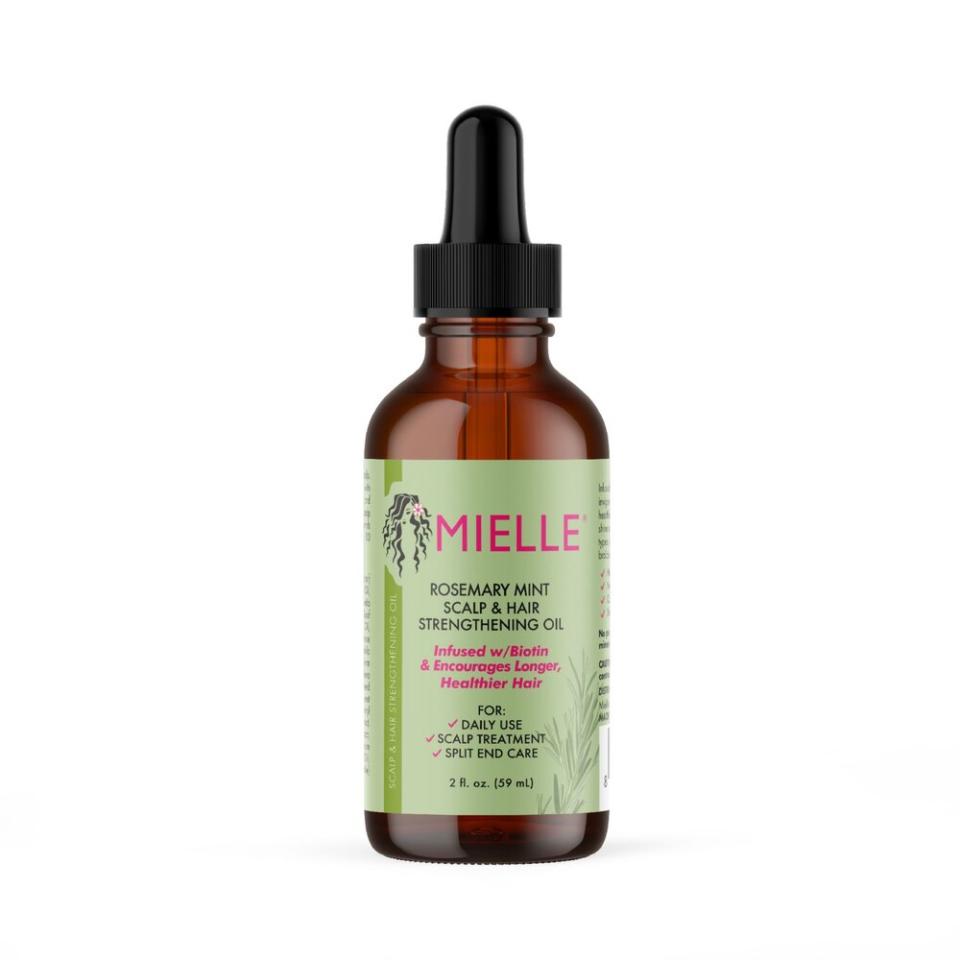
Mielle Rosemary Mint Scalp Oil
To fight scalp dryness and to nourish hair follicles, Hallajian swears by this oil, which you can snag at CVS for under $12. “Use this as a prewash scalp oil to keep the scalp healthy and boost circulation."
Best menopause hair care shampoos
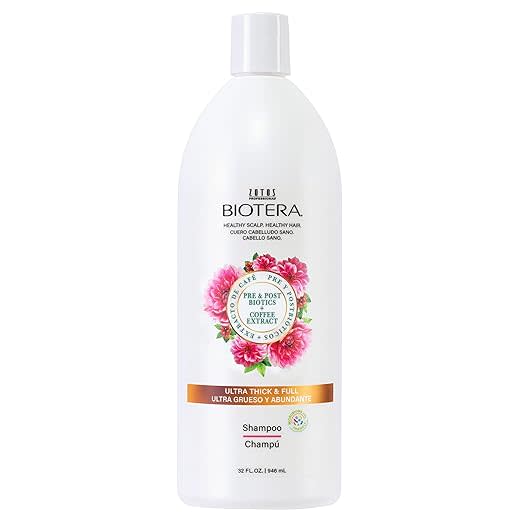
Biotera Ultra Thick and Full Collection
“Volumizing and thickening products that can provide immediate results and peace of mind are ideal when entering menopause,” says Caspara. “I recommend a thickening shampoo and conditioner that will not disrupt the scalp microbiome and contribute pre- and post-biotic ingredients to nourish the scalp like the Biotera Ultra Thick and Full collection.”
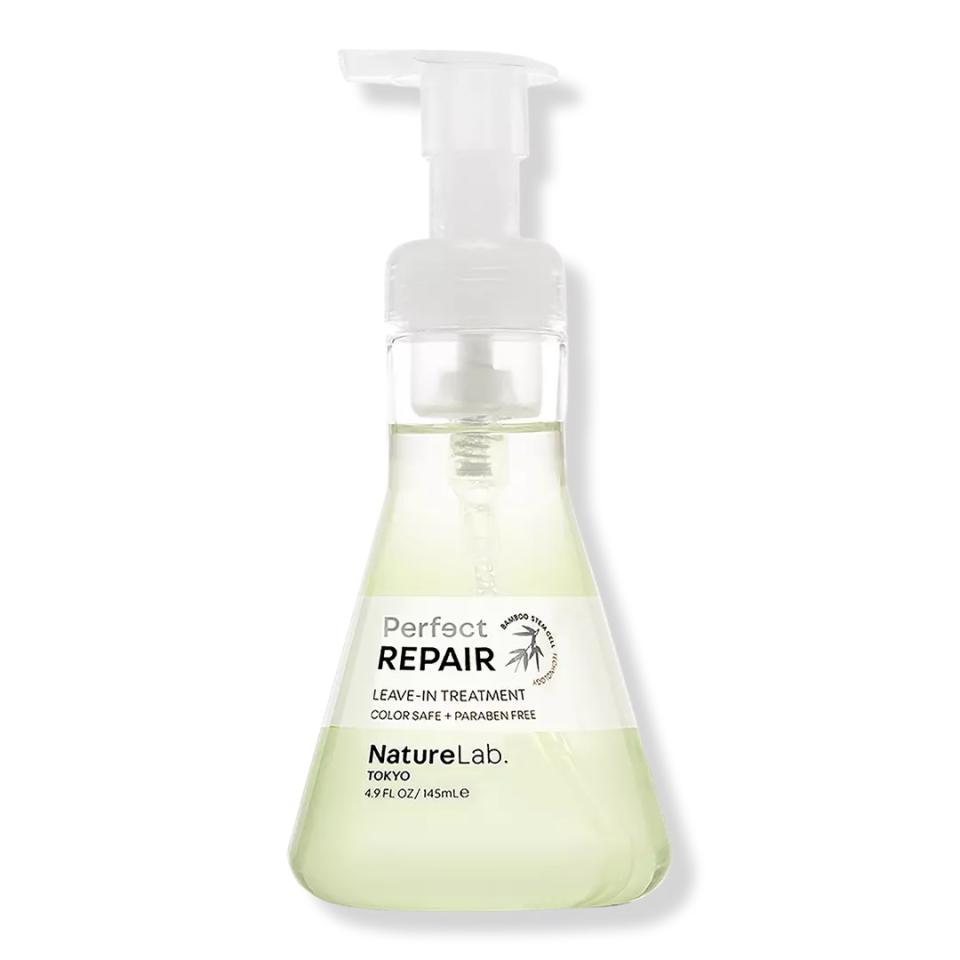
NatureLab Tokyo Perfect Repair Shampoo
“NatureLab Tokyo’s Perfect Repair Shampoo is a hydrating cleanser that restores moisture to the scalp using antioxidants and plant oils to nourish damaged hair,” says Dr. Engelman. This leaves your hair and scalp feeling clean and nourished.
Best menopause hair care leave-in conditioner
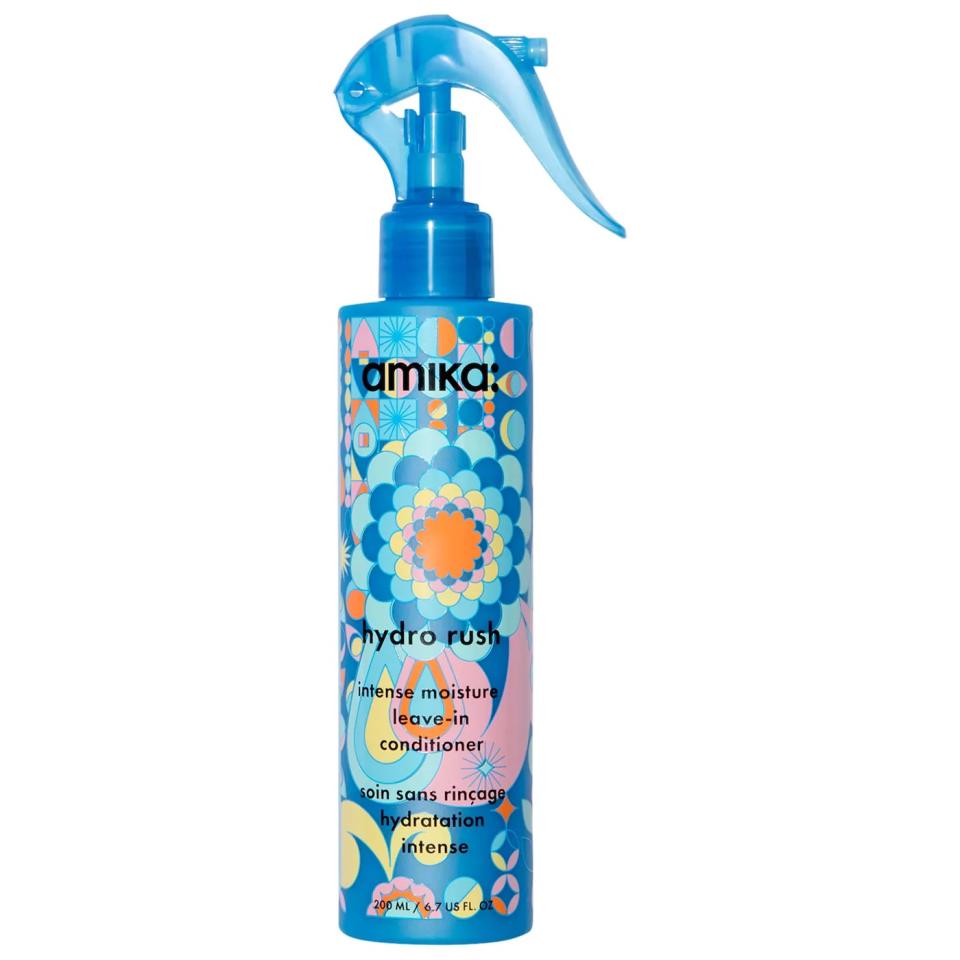
Amika Hydro Rush Intense Moisture Leave-In Conditioner with Hyaluronic Acid
“This is a great leave-in conditioner that is infused with great hydrators like hyaluronic acid and squalene that moisturize the hair and scalp,” says Dr. Ibrahim. “It can also be used on dry hair to keep flyaways under control."
Is there anything to avoid hair care-wise when in menopause?
Because your scalp and hair may be under stress during perimenopause and menopause, it’s a good idea to avoid anything that might cause further damage. This goes for the tools you use for styling, all products and even your color routine.
1. Hot tools
Dr. Engelman recommends using hot tools sparingly, especially if you're experiencing thinning. “Heat will damage your already fragile hair, worsening the issue and causing more breakage/thinning,” she says. “If possible, set the tool to a low temperature. Be sure you are also using a heat protectant, whether you are grabbing the hot tool or going out into the sun.”
And to offset any loss of moisture, Dr. Engelman suggests incorporating hydrating masks or treatments one to three times a week for extra hydration. This might also help repair heat damage, too.
2. Harsh detergents or chemicals
Dr. Engelman also advises against using anything with harsh chemicals or sulfates — and cautions against over-cleansing. “Aggressive and excessive washing can also strip the natural oils from your scalp, causing dryness,” she adds. Wash every other day if you can, and if you find that it’s ideal to wash even less frequently. Caspara recommends “subbing in an especially hydrating scalp scrub that can offset any excess build-up from infrequent washing.”
Related: Is Sulfate Bad for Your Hair? Pros Reveal What Hair Care Ingredients Are Best To Avoid
3. Certain hair dyes
Finally, similar to the damage done by excessive heat, over-processing your hair with highlights and color can be equally damaging during menopause. “Avoid using ammonia hair color, as ammonia and peroxide can cause more inflammation in the scalp and reduce hair quality,” says Hallajian. Instead, search for dyes that are low- or non-toxic or labeled as clean.
Learn more hair care tips and tricks:
Hair Glosses Are the Colorist Secret To Youthful, Shiny Hair and Vibrant Color
Hairstylist Secrets for How to Add Volume to Thin, Fine Hair So It Looks Instantly Thicker
How to Do a Hot Oil Treatment At-Home for Hair That Looks Thicker + Shinier Instantly

